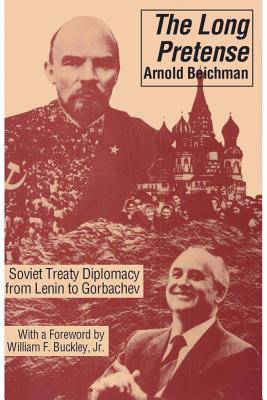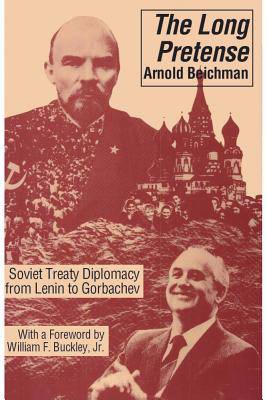
- Afhalen na 1 uur in een winkel met voorraad
- Gratis thuislevering in België vanaf € 30
- Ruim aanbod met 7 miljoen producten
- Afhalen na 1 uur in een winkel met voorraad
- Gratis thuislevering in België vanaf € 30
- Ruim aanbod met 7 miljoen producten
Zoeken
The Long Pretense
Soviet Treaty Diplomacy from Lenin to Gorbachev
€ 195,45
+ 390 punten
Omschrijving
This history and critique of Soviet treaty diplomacy focuses on the United States' relations with the Soviet Union from 1933, the year when the United States established diplomatic relations with the Kremlin, to the present. Appearing at a time of enormous change within the Soviet Union and in its relations with the United States, the book raises important questions about the degree to which the Soviet Union can be relied upon to honor its treaty commitments. As Beichman reminds us, the Soviet Union's record of treaty compliance in the past is dismal, and its continuing rhetorical strategic commitment to Marxism-Leninism as guiding ideology in its diplomatic activities is troubling.Beichman argues for a more realistic understanding of Soviet history and political culture, so that the results of treaty negotiations will be more positive in the future than they have been in the past. In effect, he argues for a risk-assessment approach, in which diplomats take seriously the possibility of treaty violation and factor the possible consequences into their diplomatic assessments. The Soviet Union's record, from arms control treaty violations to the invasion of Afghanistan, has been appalling, and the ignorance of American statesmen about the Soviet Union, from Roosevelt to Reagan, is discouraging. Despite Gorbachev's accession and liberalizing developments in the Soviet Union and Eastern Europe, he warns, caution is warranted.Using relevant texts and historical materials, supported by anecdotes and his own extensive personal experiences, Beichman presents a readable, compelling argument that is sure to be controversial. The book will be of particular interest to specialists in international affairs, and experts on the Soviet Union and Central Europe, as well as general readers interested in the course of U.S.-Soviet relations.
Specificaties
Betrokkenen
- Uitgeverij:
Inhoud
- Aantal bladzijden:
- 317
- Taal:
- Engels
- Reeks:
Eigenschappen
- Productcode (EAN):
- 9780887383601
- Verschijningsdatum:
- 30/01/1990
- Uitvoering:
- Hardcover
- Formaat:
- Genaaid
- Afmetingen:
- 165 mm x 241 mm
- Gewicht:
- 589 g

Alleen bij Standaard Boekhandel
+ 390 punten op je klantenkaart van Standaard Boekhandel
Beoordelingen
We publiceren alleen reviews die voldoen aan de voorwaarden voor reviews. Bekijk onze voorwaarden voor reviews.










